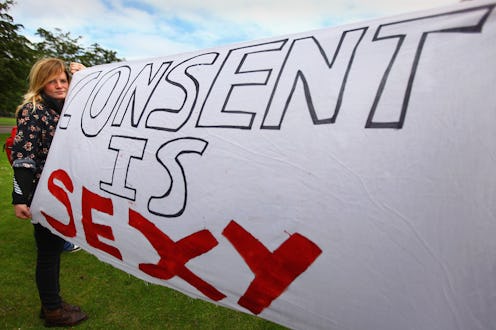Life
Here's How You Respond To Victim Blaming
We know that we clearly have a problem when 400 women have their nude pictures posted online without their consent. We know that we have an even bigger problem when a big-time news show shames the victims of this gross invasion of privacy by asking, "What's it going to take for women to get the message about taking and sending nude photos?" But thanks to Clementine Ford's response to Sunrise , we can at least maintain hope that there are good people out there working towards a solution. One of the victims herself, Ford recently spoke up about the sick nature of victim shaming and blaming in a badass Facebook post that has since gone viral — and rightly so. It's high time we stopped telling people not to get violated and start telling people not to violate others in the first place.
It seems like every other day now we hear about some sort of vile privacy breach, where women's personal images are utilized as tools for public harassment and shaming. No one is immune. Whether you're a celebrity or just an everyday person who took some naked pictures to send to a lover (or to save for yourself because you look fly, or to show your doctor a mole and be like WTF is that, or for whatever reason because you definitely don't have to explain yourself to anyone), you run the risk of having your images stolen by disgusting humans and posted online. It's a tale as old as time, and that's exactly what happened to the 400 innocent Australian women whose personal images are now floating around the Internet.
Inexplicably, though, every time a story breaks about someone's nudes being posted online against their will, the immediate response is to question their behavior. Well, she should know better. Don't take naked pictures if you don't want them to get leaked. What did she think was going to happen? This kind of rhetoric is exactly the same that is used to blame victims of sexual assault for getting attacked, and it's incredibly dangerous. This is rape culture at its finest — by which I mean it's society at its worst. And language that encourages rape culture is further entrenched and normalized when visible and important voices espouse it.
But all it takes to combat gross, widespread victim blaming is the voices of victims who refuse to be shamed. That's why Clementine Ford is our new hero. After news of the photo leak broke, a post appeared on Sunrise's Facebook page about the story reading, "What's it going to take for women to get the message about taking and sending nude photos?" Although the post has since been deleted and an apology issued, Adelaide Now managed to grab a screenshot of it; naturally, there was a huge outcry against it — and Ford's response in particular is so, so spot on. In her own words:
When Channel 7's Sunrise asks 'when will women learn' instead of 'why do men continue to view women as objects they can defile and violate while the world watches and tut-tuts', they are victim blaming. They are saying it's the responsibility of victims of crime and assault to prevent it and not the responsibility of society to make such crimes intolerable and unacceptable.
Along with her powerful statement, which you should definitely read, Ford posted the following photo, even further taking control over her own body and images.
I don't think there has ever been a more appropriate moment in history for the statement "Yassss Kween."
In response to the backlash, which included Ford's post as well as a Change.org petition and a Twitter campaign using the hashtag #forshamesunrise, Yahoo7 (the company that runs Sunrise's Facebook page) deleted the offending post and issued the following apology: “We apologise unreservedly to anyone offended by a post that was made on the Sunrise Facebook page regarding nude photos and online security yesterday, and in particular to the victims... Whilst it was not our intention we appreciate that the wording of the post was insensitive.”
I'm not one of to needlessly attack someone for a mistake once an apology has been issued, so I appreciate the apology for what it is: a step in the right direction. Does it fully get at the root of the problem? No. But an apology is a good place to start. Let's use this as a learning opportunity, and try to keep the dialogue about victim blaming going until we don't need to have it anymore.
Image: Gifrific; Clemetine Ford/Facebook
